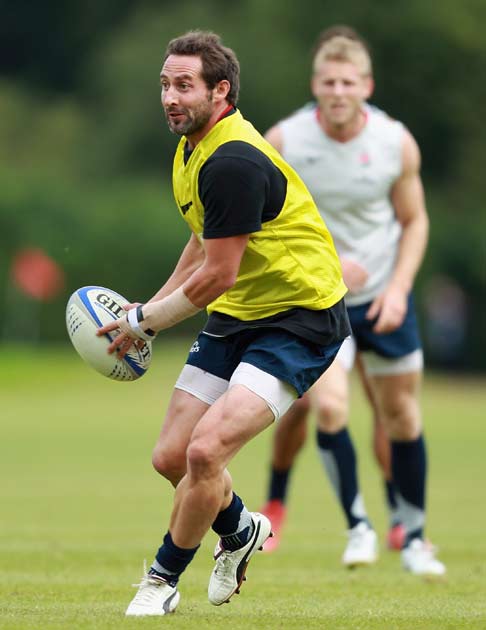Man with no club helps sevens take over world
Record-breaker Gollings hopes to lead England to Commonwealth gold

Ben Gollings sat amid the leafy splendour of the England Sevens squad's training base at Bisham Abbey and dismissed talk of dodgy toilets in Delhi. "We're used to changing in a shed, or on the side of a field," said the England captain and world master of the abbreviated game. "That's what sevens is."
Historically, perhaps, when sevens was seen as a summer run-around for fitness or an excuse for a party. But Gollings and friends are off to India next week chasing Commonwealth Games gold, after that it's the Olympics and then, who knows? Sage figures predict sevens will take over from 15-a-side rugby in second and third-tier countries, and Gollings can see their point. "I think it will become the predominant game in some countries," he said. "Why not? Sevens is easier to develop because you have to develop fewer players. It's less complicated than a lot of what happens in XVs. Players can adapt easier."
The idea was given impetus a year ago by Nigel Melville, the English chief executive of USA Rugby, after rugby was re-admitted to the Olympics for 2016 in its sevens format, not XVs. Countries with little or no 15-a-side infrastructure can now receive funding through their national Olympic associations. Naturally, the onus will be on developing a team for the Olympics. "I believe rugby's global landscape will change dramatically," said Melville. "Sevens will grow [and] players will make choices between the two rugby brands. Will countries such as Fiji give up XVs and focus on gold medals?" The International Rugby Board's world sevens series – in which Gollings has smashed every scoring record and clocked up untold air miles criss-crossing the globe – raised sevens' profile. Big crowds flock to the tournaments in Dubai and Hong Kong, London and Wellington, which Gollings likened to the advent of Twenty20 in cricket.
But Gollings' observation that sevens is simply easier to play is surely the most significant factor. "Kenya are the biggest example of the last decade," he said. "They've come on leaps and bounds." Ben Ryan, the England sevens coach, pointed to Portugal and Russia rubbing shoulders with France, Wales, Scotland and Ireland in the European sevens rankings. The Portuguese and Russians – and the USA, Canada and China – can take decades to make an impact at the 15-a-side World Cup but they have become proficient in sevens in not much more than months.
And the old powers have not ignored the trend. In July, the Rugby Football Union placed 10 sevens players on central contracts for the first time, including Gollings, who said the salary was "fair" compared with the Premiership. The Commonwealth Games squad has hardly any familiar names – and that is the point. "I can see players earning a good professional wage in full-time sevens in the near future," Gollings said. "The way sevens is going you have to look at a full-time squad. It's going to be 10 tournaments in 2011 plus a World Cup [in Russia in 2013] and soon there will be Olympic qualifiers. It will be hard to do both because the conditioning, travelling and playing all adds up and you're away so much. Clubs will move away from you if you're missing training. It will get bigger and better, new sponsorship will come in.
"Kevin Barrett [Saracens scrum-half] does it well, he's got a great relationship between his club and England. But in a year's time he might go full time in sevens. You will have to choose one or the other."
Gollings played XVs for Harlequins, Newcastle, Worcester and Doncaster, and for clubs in Australia, New Zealand and Japan. But his record 2,374 points in the world series made him more a rugby hero to ex-pats in Hong Kong and Dubai, than to those sharing his Cornish roots. After a divorce from his Australian wife, he is back living in Dorset, where he was raised. Eighteen months since his last match for Gold Coast Breakers he has drawn a line under XVs and is The Man with No Club, training alone when England are not in camp. But though his career may come to be seen as the signpost to a schism between the two forms of rugby – he plans to play in the 2016 Olympics, and believes sevens could be a demonstration sport in 2012 – the skills from one are valuable in the other. Gollings coaches children and when he places two tackle bags in front of them, he wants them to see three spaces, not two opponents. "Ninety per cent just see the bags," he said.
It was the subject of a conversation Gollings had at Buckingham Palace last Tuesday night – not with Prince Edward, the host of a Commonwealth Games send-off, but with John Steele, the new chief executive of the Rugby Football Union. "In the southern hemisphere," Gollings told his new boss, "their rugby allows them to be more open. The Premiership is a fiercely pressurised game. You are less likelyto take a crazier option because it could mean relegation.
"Our children are used to taking contact, running into players. In sevens we run away from opposition. To score a try without being touched, that's the ultimate goal in sevens. If we start teaching children that, they'll be better decision makers." It may not be the only decision rugby's players of the future will have to make.
Subscribe to Independent Premium to bookmark this article
Want to bookmark your favourite articles and stories to read or reference later? Start your Independent Premium subscription today.

Join our commenting forum
Join thought-provoking conversations, follow other Independent readers and see their replies